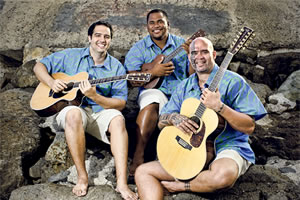Where The Past, Future Meet

|
We all know how powerful of an effect music can have on the human psyche. Hear a few recognizable chords or a familiar refrain, and suddenly a wave of memories and emotions are triggered within the recesses of the mind.
Such is the case when listening to the group Hi’ikua. One can’t help but think of yesteryear, of Tutu and Mama singing old Hawaiian songs on the porch or even hearing echoes of another former supergroup, Hui Ohana, in Hi’ikua’s rich collection of music.
Of course, none of this is by chance. The idea of remembering the past is precisely what guitarists/ukuleleists/lyricists Kalehua Krug and Kamuela Kimokeo had in mind when they decided to leave their previous group’s name (Pilioha) and success behind (Pilioha won Ka Himeni Ana in 2006 and followed that up with its one and only self-titled album in 2007, which was nominated for two Na Hoku Hanohano awards) and reform under a new name and with a new bassist, Blake Leoiki-Haili. The stage was then set for greater accomplishments in a genre that highlights smooth falsetto harmonies (Krug can sound an awful lot like the late Dennis Pavao) and slick instrumentation (Kimokeo plays a mean improvisational version of Maunaloa Slack Key on the uke, an obvious tribute to one of his mentors, Uncle Ledward Kaapana.)
The key for Hi’ikua’s members, however, has been to emphasize cultural aspects such as Hawaiian language in mele, and to do so while paying homage to their forebears.
Or as Kimokeo says, “We remember our past while moving toward the future.” The idea of this connection between what came before and what exists now and beyond is aptly conveyed in the band’s music and illustrated perfectly on the cover of Hi’ikua’s debut album, Aia I Hi’ ialo, released this summer. The cover shows the heavily tattooed Krug holding the hand of his son, who’s perched upon the musician’s shoulders.
“Hi’ikua literally means to carry on one’s back, and on our album cover, Kalehua is doing just that carrying his son on his back,” Kimokeo explains. “The name, Hi’ikua, is a heavy name to have, but we realized from the beginning that it was going to be a name we would have to live up to. But it felt right, and it was our way of recognizing that our ancestors are the ones leading us into the future.”
And honoring those yet alive.
Kimokeo does just that on the mele Pualeilani, allowing his father, Wayne “Kimo” Kimokeo, to sing the intro before the elder Kimokeo’s voice fades and that of the younger Kimokeo, along with the rest of Hi’ikua, takes over.

|
“For me, it was always about honoring my father,” Kimokeo says. “While my dad made a recording before, he was never a famous musician. So for me it was almost like me lifting him up I don’t want to say by giving glory to him but it was my way of saying, ‘This is my father, who taught me all that I know.’”
Musical Notes caught up with Kimokeo, fresh off Hi’ikua’s performance at the Live Aloha Festival in Seattle, and got the graduate assistant at the University of Hawaii at Manoa’s Masters of Education program, Ho’okulaiwi, to share a bit more about the band’s past and future.
MN: Part of what makes Hi’ikua so enjoyable is the members’ command of multiple instruments namely, guitar, ukulele and bass. Talk a little bit about your versatility as musicians particularly as it applies to you and Blake.
KK: Blake and I have known each other for a long time so I’ve always known how good of a player he was on guitar and ukulele. When Kalehua and I needed a bass player, I decided to ask Blake because he’s just talented enough of a musician to make it work on bass too. Funny thing is, when Blake and I were at King Intermediate together, he had his own band and he was looking for a guitar player. I only knew how to play the ukulele at the time, but when he asked me if I could play the guitar, I lied and told him yes. I then immediately went home and asked my dad to teach me some guitar. So you could say we’ve come full circle.
MN: Hi’ikua has gained quite a following at its shows. What is it about the band that keeps audiences coming back for more?
KK: I think many come because they’re into the Hawaiian language, while others come because they’re into the hula. But we have others who come out who are not real familiar with Hawaiian music, and they’re shocked. I guess they don’t expect the music to be as sophisticated as it is. They still expect to see what they’ve seen in the movies, with people doing simple strumming of the ukulele and singing with the heavy vibrato.
MN: While Hawaiian is at the core of Hi’ikua, band members appear to have little problem entertaining audiences with a country-cowboy classic such as Ghosts Riders in the Sky, a ragtime ditty like 12th Street Rag or a jazz standard such as Sweet Georgia Brown.
KK: That’s right. Every so often, we’ll play something from out of the blue a Jimi Hendrix song, a Beatles song or even an Eagles song. We play Hawaiian music because it’s our choice, but we play other forms of music too because we can. For me, I like Hendrix. I like Stevie Ray Vaughn. I like Al Jarreau. I like Chet Atkins. All of these musicians were very influential to me, and I’ve tried to take concepts I’ve learned from them and implement those things into the music.
SMALL-KINE notes:
Now is the time for all you songwriters between the ages of 12 and 24 to get your cre- ative juices flowing. The health- initiative campaign, “Hawaii 5210 Let’s Go,” which aims to reduce childhood obesity in the islands, is searching for original compositions for its statewide contest. Here are the small-kine details: Your song must be an original, include both the music and English and Hawaiian lyrics that promote healthy eating and active living, be no more than 3 to 4 minutes in length, and be submitted in MP3 format, with either Finale or Sibelius notation, before Sept. 30 to http://www.hawaii5210.com/31/music- song-contest. Amy Hanaialii will be one of several celebrity judges reviewing all entries and selecting the winner by Oct. 7. Aside from having his or her song used in the campaign video, the winner pockets $2,000 as well. Not too shabby.
Most Recent Comment(s):














